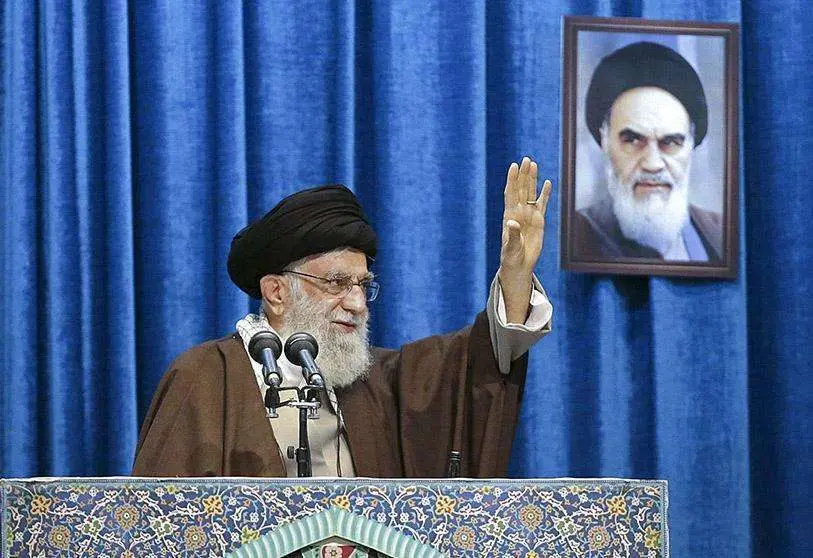Salman Rushdie: "Fatwas have been used by the Iranian authorities to exercise a form of terror"

In 1989, Djavad Laridjani, former "human rights" secretary of the Iranian judiciary, described the fatwas issued by Ayatollah Khomeini, founder of the Islamic Republic of Iran, against Salman Rushdie as a "new kind of power". "Until now it was thought that political power had to be defined in terms of military and economic power. But the Imam's fatwa has shown that the source of political power is something else; the main source of power is to influence the will of the people," he told the newspaper Etélaat on 17 February 1994. This theory, which has its origins in medieval religious dogmas, predates the capitalist era and can only be sustained in the contemporary century if it is imposed in the present era through deception, under the name of Islam, terror, murder, repression and crime.
To increase the effectiveness of his fatwa and to incite the maximum level of cruelty in his forces, Ayatollah Khomeini had declared: "Maintaining the system is an obligatory duty", meaning that maintaining the Islamic Republic was more important than any other commitment. If we take this idea to its logical conclusion, then the regime can commit any crime in the name of Islam. From the massacre in 1988 of nearly 3,000 political prisoners, more than 90% of whom were People's Mujahedin (PMOI, an armed resistance movement against the pro-democratic regime of the Islamic Republic of Iran), to the execution of tens of thousands of Muslim women, some of them pregnant, who belonged to this movement. And it was always in the name of Islam that Khomeini issued a fatwa ordering the rape of political prisoners before their execution.
Iran is one of the countries where astronomical embezzlement of funds at the highest levels of power is common practice. The Islamic Revolutionary Guard Corps (IRGC), blacklisted by the EU and the US, controls at least half of the country's economy. It controls all of Iran's ports and resorts to smuggling with China and other states, thus destroying domestic production. This force is also the most criminal repressive force inside the country and a guarantee for the export of terrorism outside the country.
A few months after accepting the ceasefire in the war with Iraq, on 18 July 1988, Khomeini issued a fatwa against Salman Rushdie. The purpose of this fatwa was twofold: to inspire the driving force of terrorism and to provoke a reaction that would overshadow the Supreme Leader's flagrant failure in the war. In the name of Islam and the war against the infidels, the mullahs' regime does not hesitate to blow up, destroy, kill, murder, assassinate and take hostages as claimed in Lebanon and Argentina. The goal? To obtain ransoms and validate a macabre strategy that also benefits from the generosity of the appeasement policy pursued by Western countries towards Iran.
"The era of deception in the name of religion and the use of the "new kind of power" is coming to an end."
This regime has worked to eliminate anyone who has stood up against dictator Bashar El Assad. However, the Syrian dictator is far from adhering to the religious dogma espoused by Iranian Shiites. It was therefore necessary to find a reason, necessarily fallacious. According to the Iranian authorities, the intervention on Syrian soil was only to defend the shrine of Zainab, the Prophet's granddaughter. Qassem Soleimani, leader of the Qods Force and the man most responsible for the massacres in Syria, is also the one who allowed the Russian intervention in this war, to carry out air strikes against defenceless populations.
The murderers and terrorists sent by Iran are all integrated in battalions called "Party of God", "Soldier of God", etc. This is "a new kind of power", which abuses the name of a religion that does not approve of these inhuman practices. It is "a new kind of power", which abuses the name of a religion that does not approve of these inhuman practices.
"History rejects fascism in the name of God."
During the recent uprisings, the Iranian people shouted at Khamenei and the mullahs' government, "You have used Islam as a tool to humiliate the people." The heinous fatwa against Salman Rushdie issued by Khomeini in February 1989 and approved by his successor Khamenei on 15 October 2015, is a demonstration that in Iran, Islam and its prophet are used as a tool by the rulers to preserve the system, no matter what the cost.
But the explosive situation facing Iranian society, the crises surrounding it on all sides and the anger of the people against the religious dictatorship, have shown that the era of deception in the name of religion and the use of the "new kind of power" is coming to an end. The succession of uprisings, demonstrations and other popular protests, despite the growing repression and the unprecedented increase in the number of executions, including public executions, are a sign of a global awakening. These exactions, as well as the rise of terrorism exported by the Iranian government in the name of religion, cannot stop history from being written. And history rejects fascism in the name of God.
Hamid Enayat, Iranian political scientist living in Europe
Article published in Marianne.net

